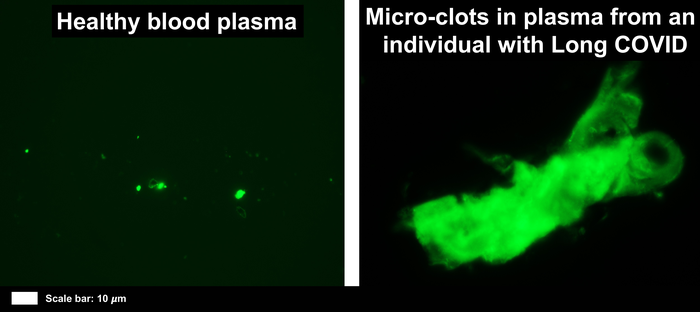A new study proposes that microscopic blood clots could be causing ongoing symptoms for some people with Long COVID
Professor Resia Pretorius, at the Department of Physiological Science at Stellenbosch University, found that she realised a connection between microscopic blood clots and blood samples from Long COVID patients.
This finding is described as “unexpected.”
At one point, vaccines themselves were being falsely described as more likely to create blood clots. While there have been rare incidents of clotting, it is demonstrably more likely that the virus itself will create a potentially lethal blood clot.
Now, scientists are looking at blood clots in Long COVID – on a microscopic, yet knowledge barrier-breaking level.
The study has been peer-reviewed and published in Cardiovascular Diabetology.
Professor Pretorius said: “We found high levels of various inflammatory molecules trapped in micro clots present in the blood of individuals with Long COVID. Some of the trapped molecules contain clotting proteins such as fibrinogen, as well as alpha(2)-antiplasmin.”
What is the importance of alpha(2)-antiplasmin?
Alpha(2)-antiplasmin is a molecule that prevents the breakdown of blood clots, while fibrinogen is the main clotting protein.

So normally, the body’s plasmin-antiplasmin system balances between clotting blood at wound sites and preventing internal blood clots.
But, with high levels of alpha(2)-antiplasmin in the blood of Long COVID patients – the body’s ability to break down the clots are significantly less strong. Blood clots are now more likely in these individuals.
In the study, the team write: “Of particular interest is the simultaneous presence of persistent anomalous micro clots and a pathological fibrinolytic system.”
Essentially, they believe that the clotting and not-clotting balance could be the key to figuring out why Long COVID happens. The information will also create a fuller picture of why COVID-19 patients are also more likely to experience deadly and mild levels of clotting.
A different team found strong evidence that COVID-19 increased arm clot risks for patients. In some cases, patients are at increased risk of heart attack, stroke or organ failure when blood clots block major arteries to vital organs.












Long covid has pretty well the same symptoms as fibromyalga, could this be caused by micro blood clots?